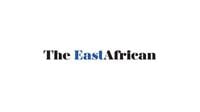
Students in Kampala, Uganda hold placards as they march to the EU mission offices to deliver a petition against the EU parliament resolution asking its members not to support the East Africa Oil Pipeline on September 29, 2022. PHOTO | BADRU KATUMBA | AFP
Sponsors of the East African Crude Oil Pipeline (Eacop) are looking for only $1.8 billion, which is expected to come from several Chinese lenders and two African banks, top officials of Uganda’s Ministry of Energy said on Friday.
“We are looking for $1.8 billion for the remainder on debt financing,” said Ugandan Energy Minister Ruth Nankabirwa.
“So far two companies from two African countries are offering,” the minister said, declining to name the companies or where they are domiciled.
She confirmed that equity financing for the project is fully paid up by its four shareholders.
However, the Permanent Secretary Ministry of Energy Irene Batebe told TheEastAfrican that most of the money required to complete the project’s debt financing will come from the “main Chinese banks”, Afriexim Bank and other African “funders that we cannot mention for now.”
Sources close to the project mentioned China Exim Bank, a long-time lender to Uganda’s infrastructure projects, as one of the financiers expected to provide some of the loans for the $5 billion project that will transport Uganda’s oil over 1,443km from Lake Albert oilfields to the Tanzania port of Tanga.
Industry analysts say that the growing number of Chinese companies getting project contracts for upstream production and Eacop suggests that China is the source of loans, and Beijing is leveraging on this to influence its firms' getting business.
Read: How Museveni killed Kenya’s crude pipeline dream
Last month, China Petroleum Pipeline Engineering signed a deal for construction and supply of line pipe for Eacop, making it the fourth Chinese firm with big money tender in the oilfield's development contracts and export pipeline deals.
Lead investor
French supermajor TotalEnergies is the lead investor in the pipeline project with 62 percent stake while the Uganda National Oil Company and Tanzania Petroleum Development Corporation each own a 15 percent stake. China National Offshore Oil Corporation owns eight percent stake.
TotalEnergies' central processing facility under construction in Buliisa, Uganda on February 20, 2023. PHOTO | BADRU KATUMBA | AFP
Eacop is financed 60 percent debt and 40 percent equity, with debt estimated at $2-3 billion, according to TotalEnergies shareholders meeting records for 2022.
During the just concluded 10th East African Petroleum Conference and Exhibition in Kampala, speakers, including the executive chairman of the African Energy Chamber NJ Ayuk, guaranteed the success of the cross-border project because “no pipeline project has ever failed due to financing”.
Ayuk, a passionate defender of Africa’s use of its minerals, oil and gas resources for energy transition, says the West should not dictate that Africa abandons its fossil fuel projects to decarbonise as this would hinder industrialisation programmes, condemning populations to poverty.
“No one should make any apologies for using their resources to get their people out of poverty,” he said.
We could not confirm if one of the African banks mentioned is Standard/Stanbic bank, which besides being a financial giant on the continent, is also one of the transaction advisers, alongside Japan’s Sumitomo Mitsui Banking Corporation, and the Industrial and Commercial Bank of China (ICBC).
There have been unconfirmed reports within the project finance industry that Chinese giant ICBC moved an estimated $1-2 billion to Standard Bank of South Africa, where it is shareholder, to capitalise the lender for purposes of lending to Eacop, which advisers to the transaction cannot confirm.
Read: Activists file complaint over US firm's Eacop role
Due diligence
Kenneth Agutamba, head of corporate communications at Stanbic Bank Uganda, said the bank cannot comment on the transactional questions relating to the project due to client confidentiality provisions.
The lender says its participation in the funding of the Eacop remains subject to its credit approval process, which includes consideration of the findings of the environmental and social due diligence assessments and meeting the Equator Principles requirements.
Activists demonstrating against EACOP IN Kampala, Uganda on February 22, 2023. PHOTO | NMG
It is also subject to a full assessment of the Eacop sponsors’ climate change strategies and targets.
“Potential lenders, including Standard/Stanbic Bank, are relying on the services of an independent environmental and social consultant (IESC/LESC) to undertake their environmental and social due diligence.
“The LESC recently concluded an update of the environmental and social due diligence report which has been shared with the lenders for their consideration. The findings of the report are currently being reviewed by internal experts,” said Stanbic/Standard Bank, adding that project finance deals are subject to a full suite of due diligence to inform decision-making processes, covering legal, technical, security, market, reserves, environmental, social and other considerations.





No comments :
Post a Comment